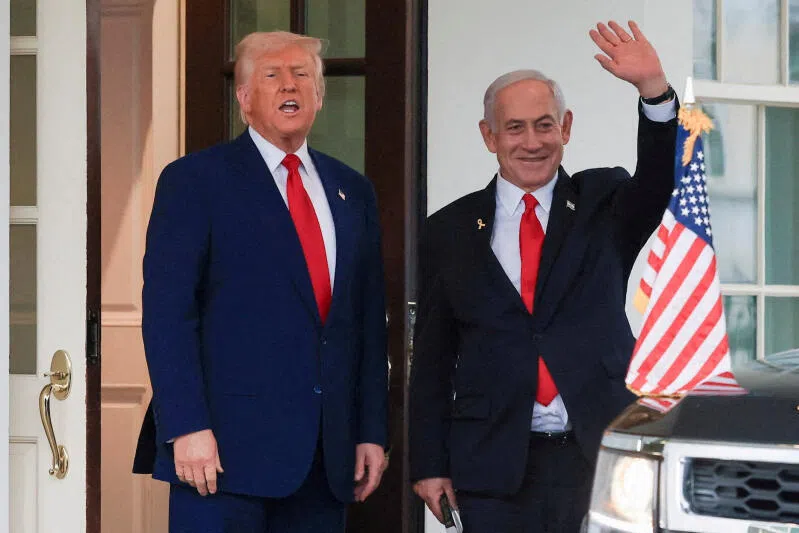Netanyahu to meet Trump as Israel faces isolation over Gaza war
Sign up now: Get ST's newsletters delivered to your inbox

US President Donald Trump speaks as Israeli Prime Minister Benjamin Netanyahu waves following a meeting in the White House, in Washington, US, on April 7, 2025.
PHOTO: REUTERS
WASHINGTON – Facing increasing isolation abroad and mounting pressure at home, Israeli Prime Minister Benjamin Netanyahu will defend his intention to “finish the job” in Gaza when he meets US President Donald Trump on Sept 29.
The meeting comes days after Mr Trump unveiled a 21-point plan
On Sept 28, Mr Trump hinted at “something special” to come in Middle East talks, adding in a post on his Truth Social platform: “WE WILL GET IT DONE!!!”
On Sept 26, he told reporters in Washington “I think we have a deal” on Gaza, even as Mr Netanyahu, speaking at the United Nations, vowed to “finish the job” in Israel’s war against Hamas.
But experts said Mr Netanyahu appeared to be cornered, facing growing international and domestic calls to end the war.
“He has no other choice but to accept” Mr Trump’s plan for a ceasefire, said Mr Eytan Gilboa, an expert on US-Israel relations at Israel’s Bar-Ilan University.
“Simply because the United States and Trump have remained almost his only ally in the international community.”
“I hope we can, we can make it a go, because we want to free our hostages,” Mr Netanyahu said on Fox News on Sept 28.
“We want to get rid of Hamas rule and have them disarmed, Gaza demilitarised, and a new future set up for Gazans and Israelis alike, and for the whole region.”
‘Comprehensive agreement’
In Israel, tens of thousands of protesters have pressured Mr Netanyahu to agree to a ceasefire, and on Sept 27 they urged Mr Trump to use his influence.
“The only thing that can stop the slide into the abyss is a full, comprehensive agreement that ends the war and brings all the hostages and the soldiers home,” said Ms Lishay Miran-Lavi, wife of Mr Omri Miran, who remains captive in Gaza.
Directly addressing Mr Trump, she urged: “Use your influence with Prime Minister Netanyahu.”
Israel’s international isolation has deepened in recent days, with countries including Britain, France, Canada and Australia officially recognising Palestinian statehood
Mr Trump’s 21-point plan, according to a diplomatic source, envisions a permanent ceasefire, the release of hostages, an Israeli withdrawal from Gaza and a major influx of humanitarian aid.
Hamas political bureau member Hossam Badran said in the evening of Sept 28 that the group “had not received any official proposal from Qatari or Egyptian mediators”.
Arab and Muslim leaders welcomed the proposal, but have also called for an immediate halt to Israel’s military operations and any occupation of Gaza.
Other elements of the plan will prove hard for Mr Netanyahu to swallow, and could even lead to the collapse of his right-wing government coalition.
Among the most controversial is the involvement of the Ramallah-based Palestinian Authority (PA) in the future governance of Gaza.
The PA ruled the territory until Hamas seized control in 2007, and its potential restoration represents a red line for Mr Netanyahu’s hardline coalition partners.
While the US proposal conditions the PA’s return on implementing reform programmes, these changes “could take years” to materialise, Mr Gilboa warned.
‘Broad consensus’
Several far-right ministers in Mr Netanyahu’s coalition have threatened to collapse the government if he agrees to the PA’s return, or if he ends the war without defeating Hamas.
However, opposition leader Yair Lapid has offered a parliamentary “safety net”, promising his centrist Yesh Atid party would support a ceasefire and hostage-release deal. but it is not clear whether other opposition parties would follow suit.
“This kind of broad plan would need a broad consensus,” said Ms Ksenia Svetlova, a former Knesset member who now heads the regional cooperation NGO Ropes.
Ms Svetlova predicted Mr Netanyahu would only accept parts of the deal, while trying to negotiate or postpone decisions on other elements “seem difficult in this moment”.
Another contentious point in the US proposal is who would guarantee security in the Gaza Strip once the Israeli army pulls out and Hamas is disarmed.
The proposal envisions an international security force
However, critical details about command structure and operational control remain unclear.
“This plan is internationalising the Gaza conflict in an unprecedented way,” Ms Svetlova said, “but without a clear plan on who will be the guiding star, what the end goals are, who will see it through.”
“The unpredictability factor runs wild here, really.” AFP


